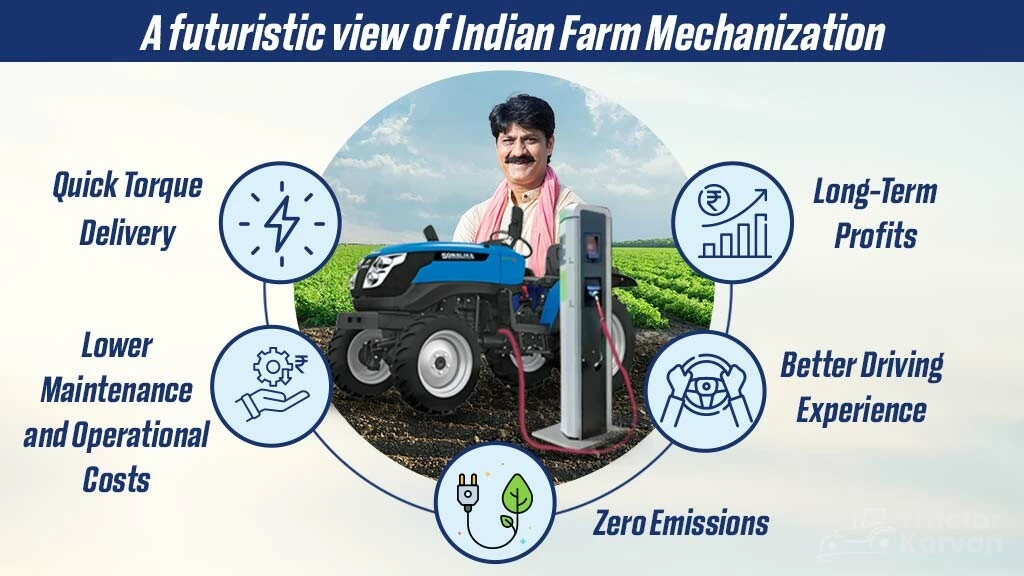Electric Tractors: The Future of Indian Agriculture

Table of Contents
- The Revolution of Electric Vehicles in India
- What are Electric Tractors?
- Need of Electric Tractors to Electrifying India
- Electric Tractors- A futuristic view of Indian Farm Mechanization
- Top Electric Tractor Brands in India
The Revolution of Electric Vehicles in India
The electric vehicle industry in India has witnessed massive growth in recent years. India is the third largest auto market globally, with an increase of over 200% from 2021 to 2022 in Electric Vehicle sales. This included two-wheelers, three-wheelers, SUVs and all the electric cars. The total number of electric vehicle registrations went from 1.3 million in 2018 to 15.29 million by 2023. The major players of this industry like Ola Electrics, Tata Motors, and Ather are joining to boost India's electric vehicle sector.
The government of India is aware of the benefits of electric vehicles, thus focusing on various schemes and subsidies in the electric value chain. The government has set a vision of achieving net zero emissions by 2070. The schemes include Faster Adoption and Manufacturing of (Hybrid &) Electric Vehicles (FAME), Production Linked Incentive (PLI) Scheme, Electric Mobility Promotion Scheme, etc. The government also aims to produce 100% of the local EVs as part of the 'Make in India' initiative. Regarding the electric tractors market in the country, India is the third largest tractor exporter globally, with 1,24,542 tractors exported during the financial year 2022-23. However, diesel is still the primary fuel for tractors, so the country's need for electric tractors has yet to flourish.
What are Electric Tractors?
Electric tractors run with the help of batteries instead of fuel like diesel or other gases. These environmentally friendly tractors help reduce harmful emissions and are a safer option for the country.
Need of Electric Tractors to Electrifying India
The need for electric tractors in India is necessary as India is still one of the most polluted countries, and it needs to lower its harmful gas emissions. Air pollution is a common problem in the country, and where there is a need to adopt electric tractors for better farm productivity without any harm to the environment. Electric tractors require less maintenance and no fuel or other gases, so this option is eco-friendly.
Electric Tractors- A futuristic view of Indian Farm Mechanization
Quick Torque Delivery: The most amazing feature of electric tractors is the instant torque delivery. Unlike diesel tractors, which need time to generate torque that delivers the required power at a certain RPM, electric tractors generate the torque instantly. Hence, you can get the desired torque from the moment you start the tractor.
Zero Emissions: One of the most essential features of electric tractors is zero gas emissions unlike diesel tractors, which run on fuel and emits harmful particles into the air, which damage environment, electric tractors run with the help of batteries, which is an environmentally friendly approach to making India greener.
Lower Maintenance and Operational Costs: Electric tractors have fewer moving parts and less wear and tear, automatically reducing maintenance and operational costs. Hence, there is a drop in the maintenance of electric tractors.
Better Driving Experience: Designed with a modern approach and technology, electric tractors increase the overall user experience as they are easy to operate and give smooth power delivery. To top it all, the noise & vibration levels are nearly zero which makes farm operations easier.
Long-Term Profits: Buying electric tractors will benefit you as these tractors give you maintenance-free long-term profitability. The one-time investment is needed, and then you are sorted for a more extended period as there is less wear and tear, so these tractors do not demand high maintenance, resulting in long-term profitability.
Top Electric Tractor Brands in India

Sonalika
In the era of electrifying India, the popular brand Sonalika offers India’s first field-ready electric tractor named Sonalika Tiger Electric. This is a 15 HP tractor. It is designed sustainably and comes with a battery capacity range of 250-350 A, which can be fully charged in 10 hours at home and in 4 hours with a fast-charging system.
Escorts
Escorts first talked about the concept of electric tractors in 2017. It was the first company to get a certificate from Central Farm Machinery Training and Testing Institute, Budni, for its electric tractor with the description “Escorts Limited, Farmtrac (26E) Agriculture Tractor manufactured by Escorts Limited”. They aimed to launch the electric tractors in the 21-30 HP segment.
Autonxt
Autonxt is India’s leading electric tractor venture that offers electric tractors with zero emissions and reduced operational costs. Their electric tractor provides a sustainable and efficient solution for modern agriculture. These tractors fall in the range of 20-45 HP.
HAV
HAV offers hybrid tractors in the HP range of 44-51, launched to reduce air pollution and gas emissions. It successfully showcased the HAV tractors in the world’s largest Agri Technica Event in November 2019 in Germany. The popular tractors are HAV 50 S1, HAV 55 S1 Plus and HAV 45 S1.
Why are Tractors left out in the Electric Vehicle Revolution?
Due to some shortcomings, India's electric tractor industry has yet to flourish. Today, farmers need higher HP tractors in their budget. However, brands like Autonxt and Sonalika in India still manufacture lower HP electric tractors or mini tractors, which cannot fulfil the farmers' requirements. Electric tractors are priced comparatively higher than diesel, so the cost is a significant problem. Brands should come up with competitively priced tractors with a higher HP range. The government launched several schemes for electric cars & two-wheelers to boost the country's electric market and provided several subsidies under initiatives like FAME. But today, they lack subsidies and loans to the farmers, which hinders the growth of electric tractors in the country. Another aspect to consider is the lack of awareness and low availability of loans for electric tractors.
Conclusion
The development of the electric tractors sector will contribute to India's agricultural growth and improve the country's electrical vehicle market. We are hoping that the government will come up with more and more schemes and subsidies, coupled with accessible charging infrastructure, subsidized electricity rates for home charging, and reduced-interest loans for farmers, which will boost the Indian electric tractors landscape to newer heights.


Related Blogs












